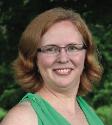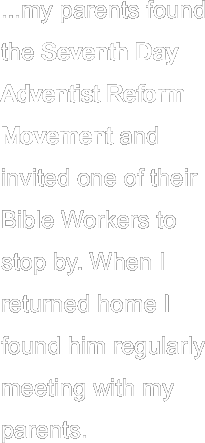
HOME / PROCLAMATION! MAGAZINE / 2014 / SUMMER / FAITH STORY MARY STOCKLER

Pedigree
I was born at White Memorial Hospital to two second-generation Seventh-day Adventists. A year after I was born, my mom got her medical degree from Loma Linda University, and then we moved to Uchee Pines Lifestyle Center in Alabama, where my first memories include Friday night vespers, thinking that pants under dresses was normal, and going to bed hungry because we were trying to follow Ellen White’s counsel that two meals a day were better than three.
My father believed Adventist doctrine but didn’t feel welcome in Adventist congregations (he called them the frozen chosen), so he often visited other churches because he felt less judged. One day my dad took us to a Christian concert put on by Agape International, and I responded to the call to accept Jesus as my Savior. They welcomed me to the family of God and sent me back to my home church to be baptized.
I was eight years old. My local Adventist pastor led me through a series of classes that included the special “truth for this time”, baptized me, and thus set my life on track. I was now part of God’s special people and had a chance to be a part of the last generation of people on earth who proved that God’s law could be kept.
For a couple years I lived as a good little Adventist girl—learning all I could about wild edibles and ways to survive in the wilderness, wondering if I would be able to stay true to the truth when probation ended. I spent many bedtimes trying to remember all my sins so I could confess them.
Leaving the Church
Then came the pro-life movement. My parents, especially my dad, got involved in the movement in the early eighties and ultimately led us out of the Adventist church. We could not, my parents explained, support by our membership a church that refused to take a pro-life stand against abortion. I agreed that abortion was a terrible sin and agreed to have my name removed from the church rolls—although I was under the impression that church membership was necessary for salvation. I was ten; I hoped God would still find a way to save me, but I figured I was probably already lost.
Still, we didn’t reject the doctrines of Seventh-day Adventism. We started homeschooling, having home church, and looking for likeminded people with whom to fellowship. Within a couple years my dad made friends with some Mennonites and asked them if he could send us kids to their school. Surprisingly, they said yes, so long as we wore clothing according to their patterns, got rid of our radios, and didn’t discuss our beliefs at school. I enjoyed the two years I spent there and learned a lot—but too soon eighth grade was over.
Searching and Return
By this time I was a teenager and was intent on figuring out how to live a perfect life so I would be “safe to save”. I read Ellen White’s (EGW) Messages to Young People and made lists of do’s and don’ts. I dreamed of being a missionary, and I questioned those around me about our doctrines, especially the Three Angels’ Messages. “Oh, you know…” I would hear. I decided they didn’t really know, either.
I went away to Pine Forest Academy in Mississippi when I was 15 and learned that some Adventists HAD come out and said abortion was wrong. I longed to be a part of God’s church and believed Adventist doctrine was correct, and so I chose to rejoin the Adventist church and was baptized back in. Before the service, however, I asked the pastor why we believed that Ellen White was a prophet and was told that I didn’t have to believe that to be a member. I could just not answer when that part of the vow was read.
After graduation I worked at Pine Forest and later at a lay-mission in Alaska. I became increasingly disillusioned; the Adventists I met all seemed to be Adventist in name only, and I could not find definitive answers to explain what a good Adventist really was. My confusion grew, and I finally got mad at God and told him that I wasn’t going to try so hard any more to be Adventist; I was just going to be a good moral person, keep the commandments to the best of my ability, and if it turned out that my efforts were good enough, He could save me. If not, at least I wouldn’t burn too long. Maybe someday I’d have time to study it all out for myself.
The Reform Movement
Meanwhile, my parents found the Seventh Day Adventist Reform Movement and invited one of their Bible Workers to stop by. When I returned home I found him regularly meeting with my parents. I joined in and was excited to find people who actually seemed to be living what they preached—and who had better answers to explain why they believed the things they did.
The rapid-fire Bible studies (or studies from “inspiration”) usually lasted about two hours and seemed to explain the doctrines—although they seemed to think questions usually came from rebellion. They also believed the church took precedence over the individual member’s conscience for, after all, Ellen White told us, “But when the judgment of the General Conference, which is the highest authority that God has upon the earth, is exercised, private independence and private judgment must not be maintained, but surrendered” (Testimonies For The Church, vol. 3, p. 492). I asked questions anyway, but I soon decided I would understand it better if I studied it for myself. My confusion was my fault, not theirs.
My dad never did join the Reform Movement but my mom did, and a year later I did, too. Shortly after I was baptized into the Reform Movement, they offered me work as a Bible Worker, and they sent me to Missionary Training School. I went eagerly, still longing to study to show myself approved—longing to practice Adventism because I understood it for myself.
The Reform Movement Missionary School was a good experience. The lead teacher would assign topics, suggest resources (the Bible, Spirit of Prophecy books, Adventist books from before 1914, and so forth), and then have us present the doctrines from our own research. The first topic assigned to me was, “Why we don’t accept the Apocrypha.”
The “right answer” to this question was that the Apocrypha teaches doctrines that contradict the Bible—for example, “angels lie.” This argument against the Apocrypha, ironically, came from a church that teaches doctrines that contradict the Bible—for example, that God lied when He held His hand over William Miller’s mistaken date in 1843!
Studying to be approved
School was also life-changing in another way. I got to know my future husband. Two years later we married and were sent to work for the church in Ontario, Canada, and studying began in earnest. I had a great study partner now. We would gather as many Bible translations as we could, pull up a Greek/Hebrew lexicon and an E. G. White CDROM on the computer, and work on understanding doctrine. Before long we found ourselves in Romans and moved forward slowly, trying to understand each word, each sentence, and each passage before leaving it. Somewhere in the process we started focusing on the Bible more than Ellen White, promising ourselves to check out her commentary later.
I got tripped up early in the process. “The just shall live by faith” (Rom. 1:17). What does that mean? “Whatever is not of faith is sin” (Rom. 14:23).
I’d been living my life trying to be right, but much of my observance was based on believing that if the church taught something, it was right. It was not by faith. I kept Sabbath—but not by faith. Suddenly I realized that my Sabbath observance was just as much a sin as not doing it at all—because I was not doing it by faith.
What was going to save me? I was proud; I’d done my best, even while my parents and I were not in the church, to hold to the doctrines of Seventh-day Adventism. Now I realized that, if I’m not alive in Christ, being a good moral person made me no less a sinner than a profligate is.
But what about the rules? Didn’t being a vegetarian or wearing the right clothes or only making friends to evangelize count for something? No, Romans answered! Whatever is not of faith is sin.
Then what was I supposed to do? “Believe on the Lord Jesus Christ and you shall be saved” (Acts 16:31). But surely it’s not that simple? “For by grace you have been saved through faith. And this is not your own doing; it is the gift of God, not a result of works, so that no one may boast” (Eph. 2:8-9).
“There is therefore now no condemnation for those who are in Christ Jesus. For the law of the Spirit of life has set you free in Christ Jesus from the law of sin and death. For God has done what the law, weakened by the flesh, could not do. By sending his own Son in the likeness of sinful flesh and for sin he condemned sin in the flesh, in order that the righteous requirement of the law might be fulfilled in us, who walk not according to the flesh but according to the Spirit” (Rom. 8:1-4).
That was wonderful news! But how did that fit with Adventism? I decided then to take back my “deal with God” to be a good moral person. Now I would seek to live only by what was clear from Him. I started studying even harder, thinking I could study my way to salvation. It doesn’t work!
I started studying topically and found that what the Bible said and what Adventism said did not agree. Time passed. Our three children were born, and we moved to California. Still I kept trying to harmonize my Adventist doctrines with Scripture, to no avail. The Bible was clear, but it did not mesh with Ellen White’s teachings.
Answers
One day I came across an Internet forum. My faith in Ellen White had been thoroughly shaken already, but I was still put off by the “anti-Adventist” tirades I often saw online. This time I read that forum, and eventually I wrote to the moderator, Colleen Tinker. I asked her to pray for me if she wasn’t too busy, and to write back if she had time. It all spilled out: “I’m having trouble seeing how Ellen White is a prophet, and what about Sabbath, the state of the dead, diet and alcohol, and meat eating? Oh—and if you’re going to get rid of the Ten Commandments, let me know before you start sleeping around!”
Colleen wrote back to me and said, “God doesn’t trick us. Ask Him to take away what is not from Him and to confirm what is.”
I had worked myself into a corner of contradictions and confusion and could not find my way out. So, at work one day, I took a minute and asked God to take away what wasn’t from Him and to confirm what was. Before I opened my eyes, I knew I was no longer an Adventist.
I felt like a cage door had opened and I was free. When I stepped out, I found the openness of God’s grace; He really knew me—with all my pride, Adventist arrogance, and attitude—and He loved me. He took those away and let me know that I was safe in His hands.
This change did not sit well at home. One of my heartbreaks to this day is that my study partner couldn’t grasp the gospel. As soon as I told him I couldn’t accept Ellen White, he told me, “There’s nothing for you here.” He told me that I would become an atheist, that there is no reason to believe in God if one doesn’t believe in Ellen White.
I protested that my reason for leaving Adventism is for the joy of salvation by grace alone, through faith alone, in Jesus Christ alone. He was unmoved, and thus began the best and the worst year of my life, 2004. For the first time I knew I was safe in Jesus, but at home there were endless discussions, dueling prayers, and struggles. My husband insisted that the God I served was not his, and that we were unequally yoked.
One day during this tumultuous time, a friend of mine suggested that I ask God to fill the house and send away what wasn’t from Him. So I went from room to room and asked God to send away what wasn’t from Him and to fill it with His presence instead. That evening when my husband came home, he walked in the door and said, “I don’t belong here anymore.” That night he prayed for God to come back to the house. I had not told him what I had done. Looking back, I am certain that he did worship a different god than I do.
By the end of that year, it was no longer safe to stay there. It felt like stepping off a cliff to take the children and leave, but every time I took a step, the ground came up to meet us. God never left us hungry or shelterless or without clothes. When we left we had what was on our backs and in the car, but every step of the way, what we needed was provided.
I had been a proud Adventist. My heritage was there. My life had been there. But God gave me something so much better—Himself!
“But whatever gain I had, I counted as loss for the sake of Christ. Indeed, I count everything as loss because of the surpassing worth of knowing Christ Jesus my Lord. For his sake I have suffered the loss of all things and count them as rubbish, in order that I may gain Christ and be found in him, not having a righteousness of my own that comes from the law, but that which comes through faith in Christ, the righteousness from God that depends on faith.”
His truth has set me free! †

Copyright 2014 Life Assurance Ministries, Inc., Camp Verde, Arizona, USA. All rights reserved. Revised August 13, 2014. Contact email: proclamation@gmail.com
 Mary Seeley Stockler grew up in a family that spent time in Adventism, then moved into a conservative Mennonite community, and finally landed in the Seventh Day Adventist Reform Movement (SDARM). Ten years ago she learned the gospel and was born again. Her new life and faith in Jesus were not understood nor well-received within her SDARM community, and for the sake of safety, the state’s court system allowed her to move with her three children to her home state of Kentucky where the four of them are thriving and attending a Lutheran church in Glasgow.
Mary Seeley Stockler grew up in a family that spent time in Adventism, then moved into a conservative Mennonite community, and finally landed in the Seventh Day Adventist Reform Movement (SDARM). Ten years ago she learned the gospel and was born again. Her new life and faith in Jesus were not understood nor well-received within her SDARM community, and for the sake of safety, the state’s court system allowed her to move with her three children to her home state of Kentucky where the four of them are thriving and attending a Lutheran church in Glasgow.
S U M M E R • 2 0 1 4
VOLUME 15, ISSUE 2
D E P A R T M E N T S
STORIES OF FAITH


MARY SEELEY STOCKLER